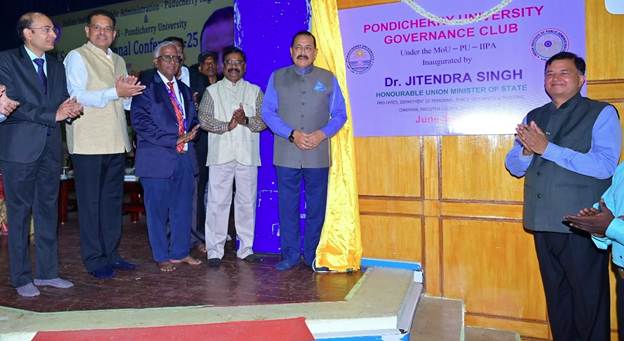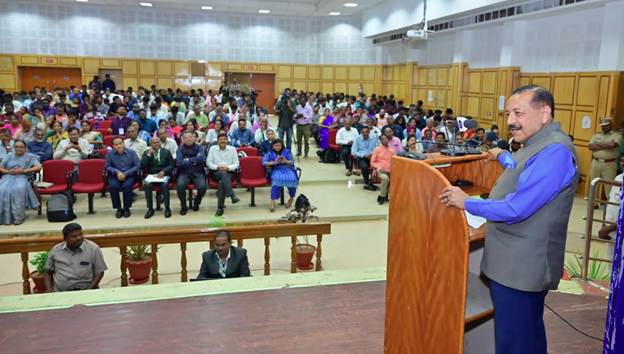Dr. Jitendra Singh Stresses Citizen-Centric Digital Reforms While Inaugurating Southern Regional Conference of IIPA
Dr. Jitendra Singh Stresses Citizen-Centric Digital Reforms While Inaugurating Southern Regional Conference of IIPA
Union Minister of State (Independent Charge) for Science and Technology; Earth Sciences and Minister of State for PMO, Department of Atomic Energy, Department of Space, Personnel, Public Grievances and Pensions, Dr. Jitendra Singh today underscored the transformative role of digital governance in shaping India’s future, asserting that the shift from “minimum government, maximum governance” to a citizen-centric digital ecosystem is central to the country’s administrative and socio-economic reforms.

Delivering the inaugural address at the Southern Regional Conference of the Indian Institute of Public Administration (IIPA) at Pondicherry University, Dr. Jitendra Singh highlighted how initiatives launched over the past decade have not only streamlined service delivery but also empowered citizens, especially those in remote and rural areas.
The conference theme, “Empowering Citizens in Digital India: Administrative, Management and Organizational Reforms,” reflects a growing national consensus on leveraging technology for inclusive development, he said.
Organized jointly by the IIPA Puducherry Regional Branch and Pondicherry University, the event also marked the launch of a Governance Cell at the university—a forward-looking initiative aimed at encouraging young minds to engage meaningfully with governance, reform, and nation-building. Dr. Jitendra Singh described the initiative as “a platform to foster a spirit of inquiry, public service, and ethical leadership among students and young professionals.”
Dr. Jitendra Singh drew attention to several governance interventions introduced since 2014, including DigiLocker, UMANG, Direct Benefit Transfer (DBT), and the JAM Trinity (Jan Dhan-Aadhaar-Mobile), noting their role in reducing bureaucratic delays and enhancing transparency. “These reforms are not just administrative upgrades—they have massive socio-economic consequences,” he said, citing examples like self-attestation replacing notarised verification and digital life certificates sparing senior citizens the need to physically prove their existence to receive pensions.
In an engaging and often personal speech, Dr. Jitendra Singh pointed out that reforms such as biometric and face-recognition-based identity systems have been instrumental in humanising governance. “It is not just about adopting technology—it’s about applying it to ensure dignity and ease of living for every Indian,” he said.

Referencing schemes like Ayushman Bharat and PM Awas Yojana, the Minister emphasized how digital tools have broadened access to healthcare and housing. “India is the only country where you can get insured for a pre-existing disease. That is a testament to our citizen-first approach,” he said.
On education, Dr. Jitendra Singh cited the “One Nation, One Subscription” initiative, which provides access to top global journals to researchers across India, describing it as a significant step toward democratizing knowledge. “The new digital ecosystem has bridged information gaps for students and researchers, irrespective of geography,” he noted.
The Minister touched upon India’s rising global standing, with key indicators such as the Global Innovation Index, startup rankings, and patent filings showing marked improvement. “From being ranked 10th globally in the economy, we are now 4th, and on track to be 3rd by 2027,” he said.
The Minister concluded with a call to gear up for “Viksit Bharat 2047,” urging greater collaboration between academia, administration, and the private sector. “Digital India is no longer an initiative—it is the default operating system of governance in this country,” Dr. Jitendra Singh said. “The next phase will depend on how we unlock our unexplored resources, from oceans to outer space.”

During the event, Dr. Jitendra Singh released the book “Digital Governance in India – Transforming Public Service Delivery” authored by Dr. T. Gopinath, Assistant Professor & Dean (Student Welfare), Department of Public Administration, Rajiv Gandhi National Institute of Youth Development, Chandigarh. He also felicitated retired IAS officer Vallavan for his distinguished contributions to public administration.
The event witnessed the participation of more than 350 attendees, including senior bureaucrats, faculty members, research scholars, students, and industry professionals from across India. Delegations from IIPA’s Southern Regional branches—Tamil Nadu, Kerala, Karnataka, Andhra Pradesh, and Puducherry—also took part. More than 80 academic papers were presented, reflecting robust engagement with contemporary governance issues.
Among the dignitaries present were Prof. P. Prakash Babu, Vice Chancellor, Pondicherry University; Dr. Sharat Chauhan, Chief Secretary, Government of Puducherry; Surendra Nath Tripathi, Director General, IIPA; Amitabh Ranjan, Registrar, IIPA, Dr Ashok Das, Dean Academics.
***